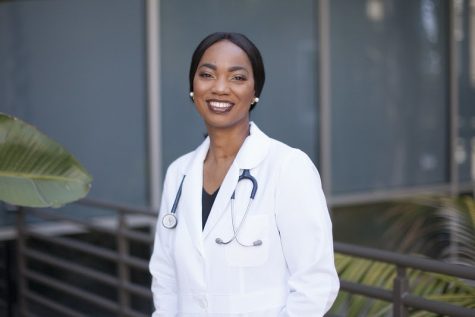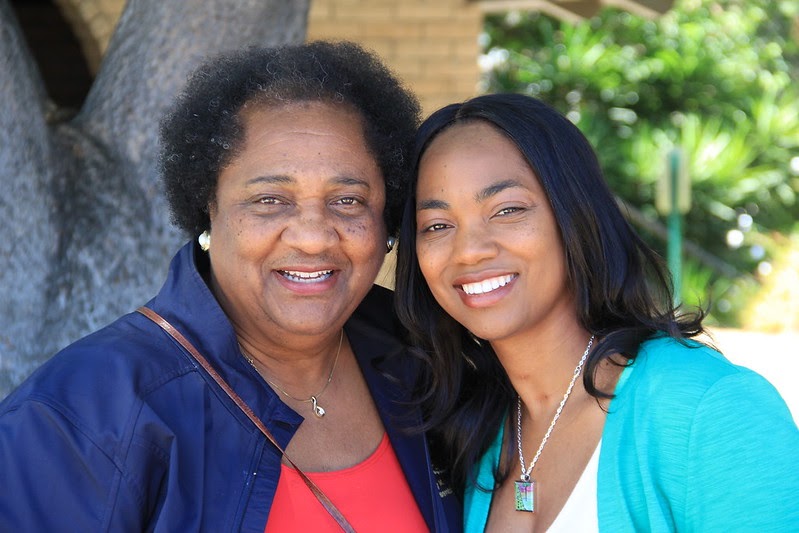On Jan. 28, Gov. Gavin Newsom swore in Dr. Shirley Weber as California’s first Black secretary of state; leaving a vacant seat in California’s 79th Assembly district. Dr. Akilah Weber, Secretary Weber’s daughter, was in Sacramento watching her mother make history.
“My grandfather was a sharecropper. Had a sixth-grade education. Couldn’t read, or vote,” Akilah Weber said. “To have my mother be appointed, confirmed and sworn in as secretary of state has been huge. This moment has been absolutely historic for my family.”
Akilah Weber serves on the La Mesa City Council and is a practicing obstetrician/gynecologist at Rady Children’s Hospital and University of California San Diego.
Weber said she is running for State Assembly to restore the health of California. Providing access to quality healthcare, education, combating food insecurity and fighting for social justice are Weber’s motivations for running for the seat.

“When you’re talking about ‘how do we make a person, community and state healthy?’ That’s why I decided to run,” Weber said.
In 2018, an African American girl at Helix Charter High School was slammed to the concrete by a police officer. The incident was disturbing enough to move Weber to run for La Mesa City Council.
“That event went viral. The reaction – or lack thereof from our council at that time prompted me to run,” Weber said.
After George Floyd’s death at the hands of a police officer in May 2020, Weber sat down with the Mayor of La Mesa, police leadership and City Council.
“We have got to do something. We cannot continue to ignore what people have been saying for years. We have to act now,” Weber said to La Mesa city leaders.
Following a summer of protests and unrest in La Mesa – and across the nation – the City Council established a citizens’ police oversight task force. The formation of the task force was a long awaited solution aimed at transparency and improving police relations with the community.
Weber is hoping to bring this approach state-wide, focusing primarily on reducing disparities in health care.
“There are so many things that play into one’s health that happens before anyone even reaches the clinic door or reaches the operating room,” Weber said.
The health implications felt by California’s diverse communities across the state are dire, and only have gotten worse throughout the course of the pandemic. According to the State of California’s COVID-19 equity dashboard, Latino, Black and Pacific Islander communities are at a severely higher risk of infection and death.
“We’ve seen the disparity in healthcare and the disparities in outcomes based on one’s access to healthcare,” Weber said.
She explained most people who die from COVID-19 have preventable conditions but lack access to healthcare.
California continues to make strides in its vaccination strategy, with approximately 500,000 vaccinations administered, according to the State of California’s vaccination progress dashboard. However, communities of color that are at the highest risk of death from the coronavirus don’t trust vaccines.
“As an African American physician, we’ve been tackling this ever since we knew the vaccine was going to come out,” Weber said.
The biggest hurdle is addressing a long history of abuse and discrimination of marginalized communities by physicians and medical researchers.
“Even in the realm of OB-GYN, which I am, Black women and Black slaves were used to figure out female anatomy,” Weber said. “There have been times in our history where the medical community has not done right by certain communities and by certain groups of people.”
Weber took photos to share on her social media accounts to demystify the vaccination process. Weber said educating yourself on the truth about vaccines can help combat hesitancy or disinformation when speaking to loved ones.
“Acknowledging their feelings and what they believe. But, also hitting them with really hard facts about COVID-19, these new variants and at this point, lots of people have had the vaccine,” Weber said.
The breakthroughs made with vaccines have brought hope to San Diegans. Weber said she’s hopeful to regain a sense of normalcy. Recently, while looking at pictures Weber said she spent time contemplating the two baseball seasons her two young sons missed out on in the last year.
Like so many Americans, Weber and her family miss the joyful, little things in life that have been lost in the pandemic.
“These activities are very important in one’s upbringing and who you ultimately become. Things you think back on and remember,” Weber said. “I’m hopeful this has shone a spotlight on everyone, that we understand the things that are important, things we need to start focusing on and things we need to start cherishing.”
Weber is heading into the April 6 primary with the Democratic Party endorsement, winning 97% of the vote. Despite the party’s support in this special election, Weber is urging San Diego State students, faculty and staff to join the democratic process.
“This election will determine the legislator who will represent you and your area, making decisions about what is going on in terms of funding and resources that are going to funnel into your school and your community,” Weber said. “Once they’re in, these decisions that are made can have long-lasting impacts that can be very hard to change.”









